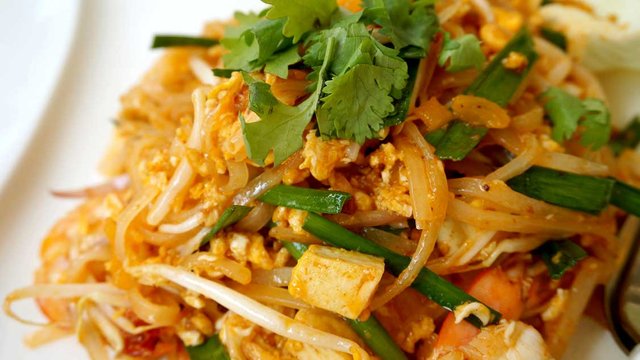Thai cuisine is a feast for the senses, known for its bold flavors, fresh ingredients, and aromatic spices. What makes Thai food truly remarkable is its versatility, which allows many dishes to be adapted to suit vegetarian and vegan diets without losing any of their vibrant flavors. Whether you’re craving a creamy Green Curry with tofu or a spicy stir-fry, Thai cuisine offers a wide range of plant-based options that are both nutritious and delicious. In this blog, we’ll highlight some of the best vegetarian and vegan-friendly Thai dishes and share tips on how to adapt traditional favorites into mouthwatering plant-based versions.
The Richness of Thai Plant-Based Cuisine
Thai cuisine naturally incorporates a variety of vegetables, herbs, and plant-based ingredients, making it easy to create flavorful vegetarian and vegan dishes. Staples like coconut milk, lemongrass, galangal, and Thai basil bring depth and complexity to the food, while ingredients like tofu and tempeh serve as excellent substitutes for meat. The adaptability of Thai cooking means you can enjoy all the bold and savory flavors, even when making plant-based choices.
Delicious Vegetarian and Vegan Thai Dishes
Green Curry with Tofu
Green Curry is a classic Thai dish known for its rich coconut milk base and aromatic green curry paste. When paired with tofu instead of meat, it becomes a perfect vegan dish. The tofu soaks up the flavorful curry, creating a satisfying and hearty meal that’s packed with green vegetables like bell peppers and Thai basil. Serve it with jasmine rice to complete the dish.
Pad Thai with Tofu or Tempeh
Pad Thai is one of Thailand’s most iconic dishes, and it can easily be adapted to a vegetarian or vegan diet by swapping fish sauce with soy sauce or tamari and replacing eggs with tofu or tempeh. The result is a savory, tangy stir-fried noodle dish that’s loaded with flavor, topped with peanuts, lime, and fresh herbs.
Tom Yum Soup (Vegan Version)
Traditionally made with shrimp, Tom Yum Soup can be turned into a vegan-friendly dish by using tofu or mushrooms instead. The soup’s spicy, sour broth is flavored with lemongrass, lime leaves, and galangal, making it a light yet flavorful option for vegans looking for a hot and tangy dish.
Som Tum (Green Papaya Salad)
Som Tum is a refreshing green papaya salad made with shredded papaya, tomatoes, peanuts, and a spicy lime dressing. By omitting fish sauce and shrimp, this salad becomes a vegan-friendly dish without compromising its signature crunch and bold flavors. It’s the perfect light meal or side dish for hot days.
Massaman Curry with Chickpeas and Potatoes
Massaman Curry is known for its rich and slightly sweet flavor, often made with meat and potatoes. However, by substituting chickpeas and extra vegetables, this curry transforms into a hearty vegan option. The combination of coconut milk, tamarind, and spices creates a comforting and satisfying dish that’s perfect for cooler days.
Thai Spring Rolls with Peanut Sauce
Thai spring rolls are another versatile dish that can be made entirely plant-based. Stuffed with fresh vegetables and rice noodles, these rolls are paired with a rich peanut dipping sauce for a refreshing and flavorful appetizer or snack.
Tips for Adapting Traditional Thai Dishes to Plant-Based Versions
Replace Meat with Plant-Based Proteins
Tofu, tempeh, and seitan make excellent substitutes for meat in many Thai dishes. These ingredients readily absorb the flavors of Thai sauces and spices, providing a satisfying and protein-rich option in stir-fries, curries, and soups.
Swap Fish Sauce for Soy Sauce or Tamari
Fish sauce is a common ingredient in Thai cooking, but it can easily be swapped with soy sauce, tamari, or vegan fish sauce alternatives. These substitutes retain the umami flavor that’s essential to many Thai dishes.
Use Coconut Milk for Creaminess
Coconut milk is already a staple in many Thai dishes and is naturally vegan. It provides the creamy base for curries like Green Curry and Massaman Curry, adding a rich, luxurious texture to the dishes. For a lighter option, use reduced-fat coconut milk or a blend of coconut milk and vegetable broth.
Omit Eggs or Use Vegan Egg Alternatives
In dishes like Pad Thai or Thai fried rice, eggs are often included, but they can be omitted or replaced with scrambled tofu for a vegan version. Chickpea flour-based egg substitutes can also be used to replicate the texture and flavor of eggs in these dishes.
Be Mindful of Hidden Animal Products
When ordering or cooking Thai food, it’s important to check for hidden animal products like fish sauce, shrimp paste, or oyster sauce. Many restaurants are happy to accommodate vegan requests, and you can often find vegan versions of these ingredients in specialty stores or online.

Conclusion: Savor the Variety of Thai Plant-Based Cuisine
Thai cuisine is incredibly flexible, making it easy for vegetarians and vegans to enjoy a wide range of flavorful, satisfying dishes. From the creamy goodness of Green Curry with tofu to the light and refreshing Som Tum, there’s a plant-based Thai dish for every taste and occasion. With a few simple swaps and substitutions, you can adapt traditional Thai recipes into delicious vegetarian or vegan versions that still capture the essence of Thai flavors. So, embrace the versatility of Thai cuisine and discover the joy of plant-based eating with these delicious options!

info from blog https://www.saosiam.org/blog/vegetarian-vegan-thai-food-plant-based-options